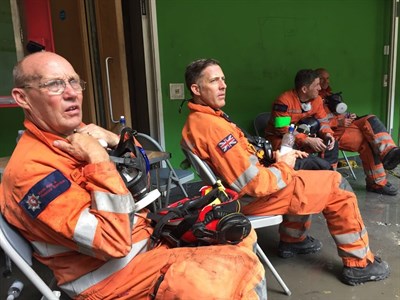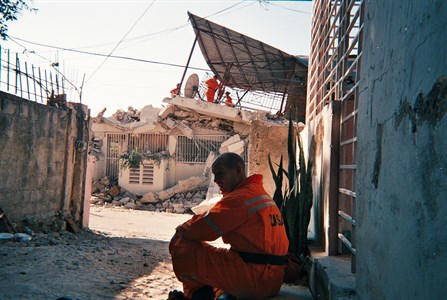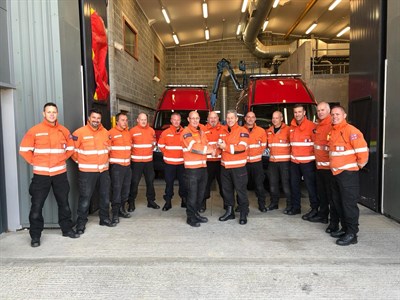The UK’s longest serving operational firefighter retires
12 October 2018
Media, Working for KFRS
Watch Manager Malcolm Cowie, believed to be the UK’s longest serving operational whole-time firefighter, is hanging up his helmet after serving with Kent Fire and Rescue Service for half a century.
The 65-year-old has dedicated his life to the service after joining at 16 as a junior firefighter in 1969, having been inspired by a cousin who was in the fire service.
With almost 50 years now under his belt, he’s attended thousands of incidents ranging from small fires and simple rescues to devastating explosions and international aid missions.
Living in Deal, Malcolm has been based at his local fire station for large sections of his career, but his role has seen him posted to a number of different stations around the county, including Sevenoaks, Tunbridge Wells and Dover, as well as abroad as part of his specialist UK International Search and Rescue work.
Malcolm said: “I’ve been to so many incidents over the years, and there have been so many that have impacted me. It’s the larger ones that you remember the most as they’re the ones that are talked about the most. For example, the Crypt fire at Dover (March 1977), the Herald of Free Enterprise ship disaster (March 19877), the Deal bombing (September 1989), and the fires at the paper mills. They all have an impact, but I suppose it’s often the incidents that you tend not to talk about that probably have the biggest impact on you.”

Over the years Malcolm’s dedication to the fire service hasn’t gone unrecogonised. In 2008 he was awarded the prestigious Kent medal - a rare accolade recognising outstanding service and commitment to Kent Fire and Rescue Service (KFRS) and the wider Kent community.
During his career, Malcolm has become deeply involved in search and rescue, joining the UK Fire Search and Rescue team in its founding days and becoming an early member of the overseas UK International Search and Rescue team, which responds primarily to international disasters on behalf of the UK Government, and crews are deployed to assist in search and rescue missions all over the world.
He was also heavily active in the setting up of Kent’s Urban Search and Rescue (USAR) Team, now known as the Technical Rescue Team – one of the UK’s first fully operational teams able to respond to a wide range of major and catastrophic incidents, including chemical, biological, radiological and nuclear events, search and rescue scenarios, major flooding and transport incidents.
Malcolm said: “My role within search and rescue has allowed me to attend many incidents abroad, including the volcano on Monserrat back in 1995, the Kosovo conflict, the Haiti Earthquake in 2010, and many more. The work has been very varied from search and rescue, to teaching and training, and refugee aid.

Monserrat
“Our job in Monserrat was predominantly to train their search and rescue team, but we did end up doing some search and rescue ourselves because about 40 minutes after we arrived the volcano decided to erupt. The power was immense, enormous, indescribable. A huge boulder about the size of a small house had been spat out by the volcano some two to three miles away, and that really highlighted the true power of nature."
Kosovo
“Kosovo was an aid mission during the conflict. The war was going on at the time and we were working at an airbase which was military and civilian. My role there was to offload aid from aircrafts and get it to the trucks and out to the refugee camps. We were there for about 5 weeks and it was the hardest work I’ve ever done, it was constant."
Haiti
“We were sent to Haiti after the earthquake on a search and rescue mission, and we were part of the first rescue teams to land there. Conditions were terribly hard, the temperatures were in the high 30s and the devastation was enormous. As we all know there were over 250,000 fatalities. But the Haitian people were great people, surviving people, and good people to work with, as were the other international search and rescue teams we worked with. We worked hard and we hope we left the people and the area in a better place than how we found them.”
The fire service has changed and advanced dramatically during Malcolm’s time at Kent Fire and Rescue Service. He said: “Technology is a big change. When I joined the fire service we’d never heard of a computer, let alone had a computer. So that’s been a massive change and it’s made a big difference to how we work.
“Incidents have changed too. When I started we had a lot of fires, particularly house fires, and not that many road accidents. I probably only attended one or two road accidents in my first year. Now it’s swung the other way, we seems to be getting an awful lot of road accidents and not so many fires. That’ll be down to the changes in things like building construction, technology and smoke detectors.

“People have changed because of education. They’re far more educated about how to keep themselves safe, and not just from fires, in all walks of life.
“The firefighters however are the same sort of caring, practical person as they’ve ever been. And those are probably some of the biggest qualities of a firefighter. The comradery, team work, and the friendships you build over the years, all those things – they’re just the best bunch of people.”
When Malcolm was asked to describe his time within the fire service he said: “Enjoyable, rewarding and not least, fun.”
Ann Millington, Chief Executive at Kent Fire and Rescue Service, said: "Our very best wishes to Malcolm in his retirement – he has been a role model for compassion, technical expertise and commitment to the people of Kent. His contribution has been magnificent and I thank him for everything he has done."
news 14-10-2018